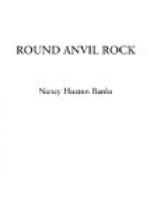“And I must again remind you that we do not know that Philip Alston has anything to do with the lawlessness of the country,—we merely suspect him. Suspicion and evidence are different things; so widely different, indeed, that I may have done grave wrong in even mentioning the first to you.”
“Then we must try to find out the truth—try to lay our hand on the evidence which will prove Alston’s innocence or his guilt. Doing that cannot harm her—if she is happy in this engagement,” with a strong effort, “and it may help her—if she is not.”
The priest shook his head. “You forget that many able men have already tried hard to do what you suggest, and that every attempt has failed.”
“That hasn’t a straw’s weight with me. I shall not fail, because I am going to try harder than any one else ever can have tried,” with the confidence and courage that belong to love. “I think I can do something to aid the officers in gathering evidence. My work, carrying me over the whole region where these villains do theirs, gives me opportunities to know what is going on. I shall speak to the attorney-general early to-morrow morning. Every honest man owes it to the state to give such help as he can in this extremity.”
“Take care,” said Father Orin, gently. “I am doubting more and more the wisdom and right of having told you these stories about Philip Alston. Remember, they are merely rumors, widespread and generally believed, it is true, yet still wholly unsupported by evidence. We must be careful. There is a bare possibility that we may be wrong, that we may be doing a terrible injustice to an innocent man. I do not believe that anything can be long believed by a great many honest people unless there is some truth underneath for it to rest upon; and this about Philip Alston has been believed by the best men of this country for a good many years. But the fact that it hasn’t been proven remains, nevertheless. There has never been a shadow of real evidence, and we, as fair-minded men, are bound to remember that.” He hesitated for a moment, and looked at the young doctor as if uncertain whether to say something else that was in his kind, wise thoughts. “There is another thing that you would do well to bear in mind, my son. Any one bringing any charges, supported or unsupported, against Philip Alston, will break that little girl’s heart. She would never credit the strongest proof. A woman like that,—a tender, soft, clinging, unreasoning little thing,—who is all affection and trust, could not be reached by testimony that would convince any jury. That is one of the merciful dispensations; that is one of the reasons why men get so much more mercy here below than they deserve. This gentle girl not only would never believe, but she would never, never forgive you for breathing a word against Philip Alston. That is the way with women of her kind. And you would not wish to hurt her, even though—”




